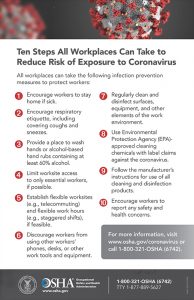The COVID-19 pandemic continues to present many challenges for the Michigan workplace. The law and circumstances are changing almost daily. We are regularly monitoring and updating workplace rights resources we have found helpful. Additional Blanchard & Walker Resource Pages and Factsheets provide more detailed discussion on specific COVID-19 topics:
- Workplace Safety – Industry Specific and Local Guidance in Michigan
- UIA Unemployment Benefits in Michigan under COVID-19
- The Courts and COVID-19
Keep in mind this is not intended to be legal advice. Legal rights in any individual case need to be evaluated in consultation with an attorney. Continue reading “COVID-19 Employment Law Updates and Legal Resources (Updated 12/21/2020)”

 In the middle of the COVID-19 pandemic, Azanean Petty was
In the middle of the COVID-19 pandemic, Azanean Petty was 